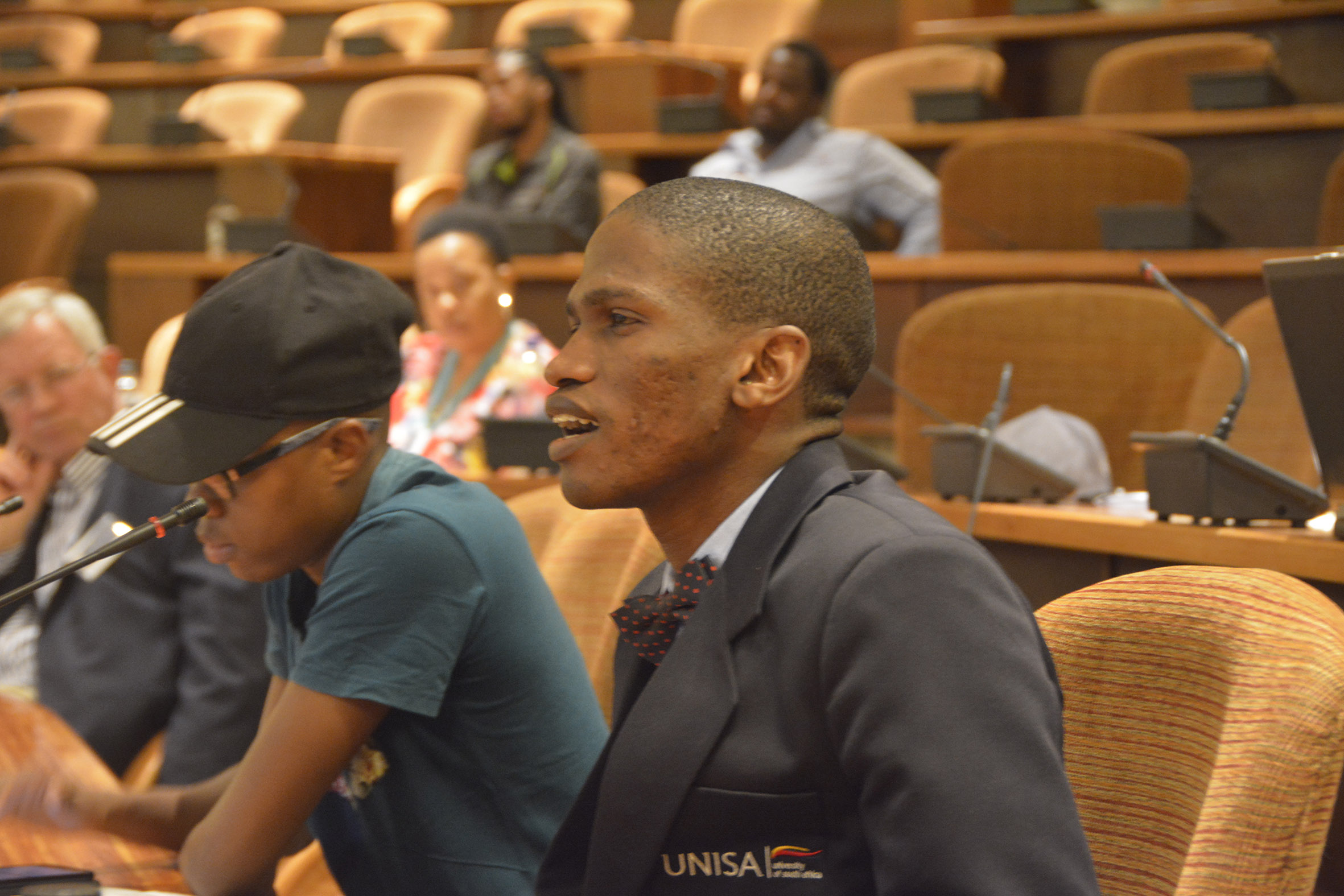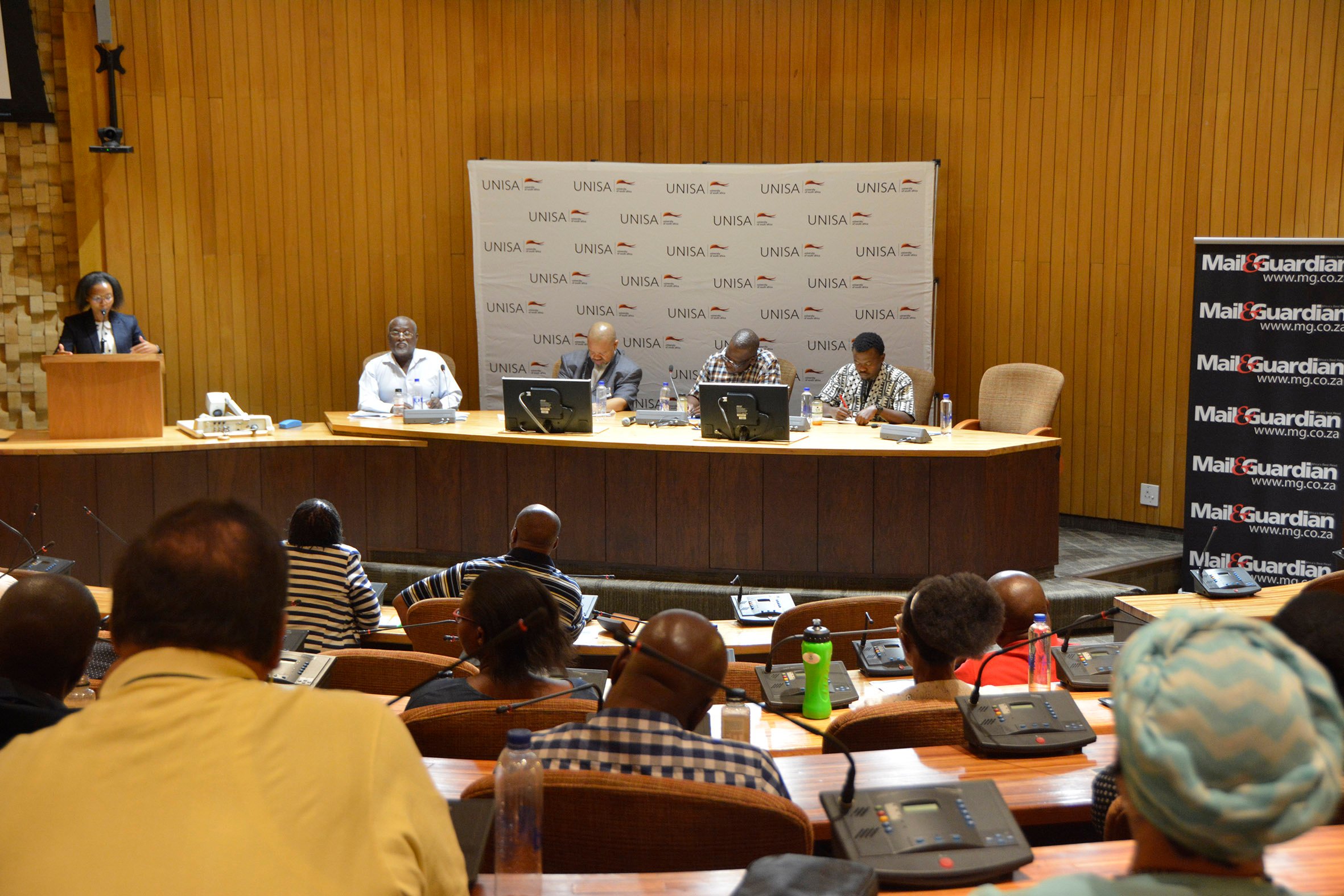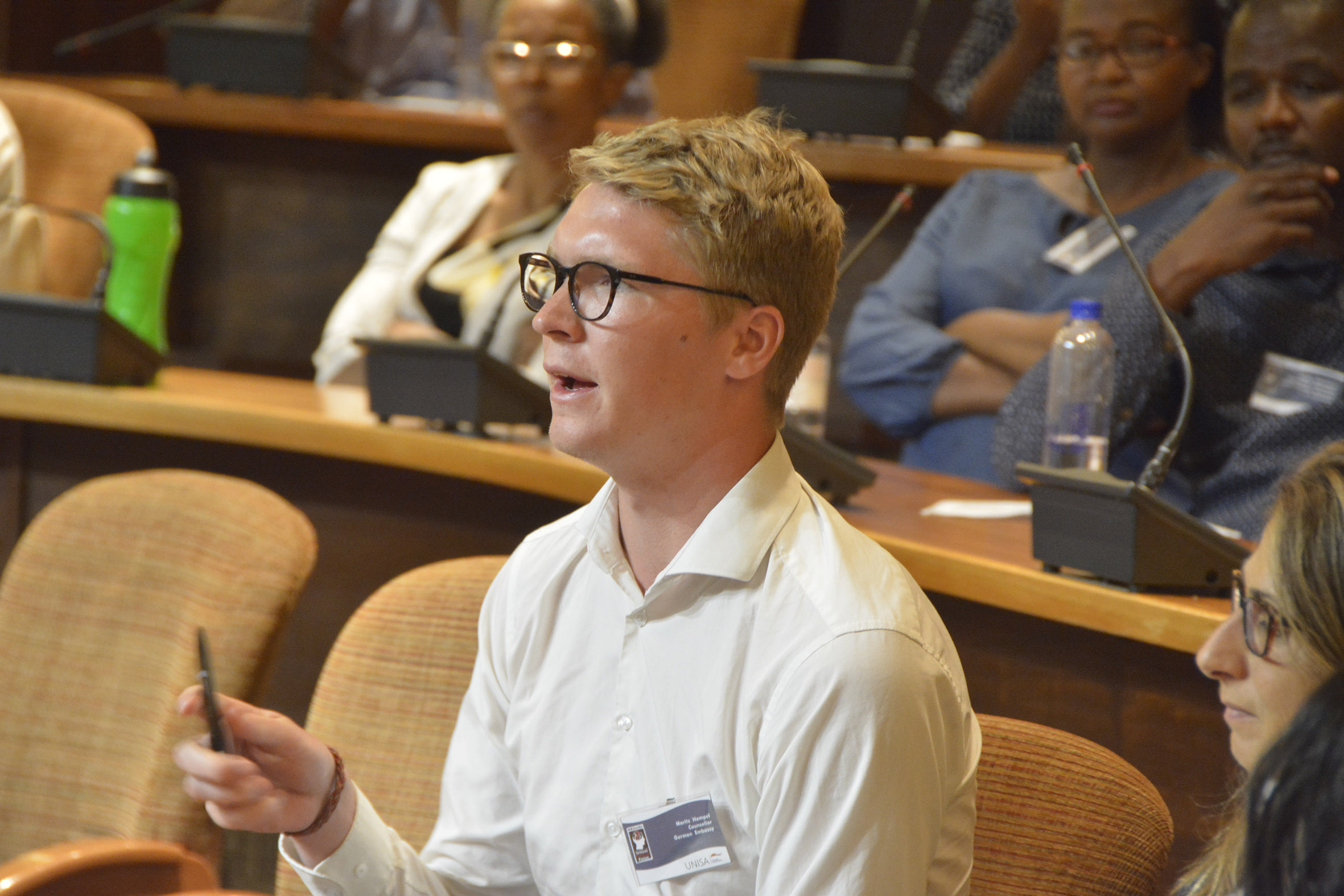Ntando Sindance
Inequality in the higher education sector is not only about material and resource disparities, but also about social and cultural inequality among diverse student and staff at these institutions. This inequality, the subject of the Critical Thinking Forum hosted by Unisa and the Mail & Guardian, is a result of the elevation of Western epistemologies and ontologies over African epistemologies and ontologies.
Any programme towards academic and social justice must overhaul this culture, given that it makes higher education inaccessible, exclusionary and de-humanising; and so the forum was themed around social inclusion, anti-racism and re-humanising higher education. The panel comprised Unisa’s principal and vice-chancellor Professor Mandla Makhanya; Director : Scholarship, Change Management Unit at Unisa Professor Sabelo Ndlovu-Ndlovu-Gatsheni ; the deputy director of social inclusion and equity in the department of higher education, Wonga Tabata; and post-graduate research assistant at Unisa’s College of Law, Ntando Sindane.
In his welcoming address, Makhanya said diversity is the opposite of uniformity. It is a gathering of difference and, in South Africa, it is a guide in our journey as we move towards democracy. He referenced the diversity represented during Unisa’s more than 90 graduation ceremonies. These gatherings of difference include students and cultures from other African countries, multiple age groups, men and women and a range of races are represented. But he questioned whether this was indeed diversity in action. As more African students register and take their place alongside Indian, coloured and white students, to be merely registered is not enough. He emphasised that diversity should mean equity of access, and must be aligned to a more profound transformation that achieves equity of opportunity, participation and meaningful engagement. It must bring an equal sense of belonging that students can proudly vouch for and own. He argued that this understanding of diversity in action, when aligned with inclusion, is at the heart of the university culture and human rights broadly.
 SRC secretary general at Unisa Tsholofelo Kgaswane and deputy president of the SRC at Unisa, Sello Nkhatho
SRC secretary general at Unisa Tsholofelo Kgaswane and deputy president of the SRC at Unisa, Sello Nkhatho
The concept of inclusion, when more carefully assessed, seems intangible and difficult to attain. A sense of belonging that is not easy to explain, but the experience of the absence of which is far easier to speak of and is familiar to many students and staff who are yet to be able to claim universities as their own.
Makhanya said students, when referring to institutions of higher learning, should be able to say “this is my place”. This sense of belonging is a result of “ownership of a space that exists to serve society in its entirety. Raising awareness about diversity is not enough, but institutions of higher learning must also raise critical consciousness not only to diversity, but to issues of equity, power, privilege and oppression, as these occur in many universities, but largely in our contact universities.”
Inclusion is inherently social. The democratic ideals of equality, non-racialism, non-sexism, religious freedom and the respect of different cultures and identities are at its core. “Inclusion is also academic because, through the enlargement of diversity, other ways of knowing come into the picture. With the acknowledgement of differences, knowledge becomes multiple and heterogeneous, instead of monolithic,” Makhanya said.
This means that inclusion with the view of assimilation must be thrown out. The global silencing and exclusion of indigenous and subaltern knowledge has resulted in the dehumanising of higher education.
The same is true in the South African context, where European canons have been elevated and privileged above African knowledge. This epistemic injustice limits the possibilities of inclusion with equal intellectual participation.
Makhanya cited the importance of scholars who advocate for transformation by enlargement, by bringing in African knowledge to the academy, thus broadening intellectual participation so that students are exposed to new ways of knowing.
Different institutions are likely to display a different, and perhaps inadequate, commitment to transformation. Change is uncomfortable and will be met by resistance. How does one expect decades old institutions to fundamentally change what they pride themselves in being, and ask them to do things differently?
It is the responsibility of the state to ensure that institutions of higher learning fulfill their role of existing for the benefit of diverse members of society.
The policy framework for the realisation of social inclusion in the post-school education and training system was published in December 2016 by the department of higher education and training. The framework incorporates, inter alia, instilling a culture of human rights and promoting anti-racism and anti-discrimination.
Tabata said these objectives can only be achieved through constant engagement between the department, institutions and citizens. He reflected on the department’s journey since 2009, when it was established as a separate department from the department of education, to develop a policy framework that speaks to social inclusion. Policies that advocated for inclusion in the education system were fragmented, and were not put together as a framework that could serve as a monitoring tool to be used at institutions of higher learning.
It was only after policy analysis and consultations that a draft policy framework was released in October 2014 for public comment, which culminated in the existing policy framework for social inclusion in 2016.
 Panelists at the Critical Thinking Forum on social inclusion, anti-racism and rehumanising higher education
Panelists at the Critical Thinking Forum on social inclusion, anti-racism and rehumanising higher education
The policy framework sets out to assist institutions of post-school education and training with the implementation of social inclusion. It also serves as a monitoring tool for the department to ensure that social inclusion priorities are achieved.
Tabata said these objectives would be achieved through partnerships, shared objectives, citizen dialogues and continuous engagement between the department and the institutions of higher learning. Social inclusion is not an event, but a lifelong process. The fact that the policy framework is not even a year old means that the fruits of this process will not be enjoyed by the current generation of students.
The assessment of this social contract between the department, institutions and citizens of the country may be seen only in the future when old institutions with ingrained institutional cultures are transformed.
For the department, key objectives for the transformation of the post-school education and training sector includes universities of all types: the skills development branch responsible for the Skills and Development Authorities (Seta), technical vocational education and training (TVET) colleges and the community colleges sector. The transformation objectives encompass race, class, gender, age, disability and citizenship. This broad scope is often lost in the public discourse about the transformation of higher education. Debates should highlight the importance of institutions producing well-rounded, socially conscious students who will contribute to solving the country’s problems.
Tabata said that institutions of higher learning are a microcosm of an unequal society. The framework to transform the sector appreciates the depth and history of race and class divisions, as well as of existing conflict and tensions.
The framework defines social cohesion as the extent to which a society is coherent, united and functional and provides an environment in which its citizens can flourish. Social inclusion is a concept that embraces all of humanity and cuts across all factors that divide the human race. It recognises that we are all human beings, informed by a desire to create a more humane and interconnected world.
The two concepts reinforce each other and must be seen as such at institutional level. Effective monitoring of the progress at institutions of higher learning to achieve social inclusion and to re-humanise universities will be the game-changer.
What should be done to achieve this inclusion?
Many students will affirm the de-humanising nature of higher education. A concerted effort to understand who students are and where they come from, and to tap into the talent pool available to African institutions, will allow for the tailoring of inclusive syllabi that speaks to the diversity of students.
When there is a sense of belonging in the student population, the possibility of success and flourishing is far greater, than when higher education alienates. There must be investment in social justice for human flourishing. Even universities that have been designed to serve the elite can be used for the fulfillment of a transformative agenda. Without this, real social inclusion remains a pipe dream.
Ndlovu-Gatsheni views the issue of exclusion and inclusion from an ontological perspective. He argues that the problem of exclusion and inclusion can be traced back to the “coloniality of being”. Humanity was socially classified and racially hierarchised. Some people were denied being human for the purposes of enslavement, colonisation, exploitation and exclusion.
Before any project of inclusion can take place, we must first be equal. Those who have been denied humanity need the restoration of their humanity first. Inequality in higher education has its roots in the denial of humanity of some people. Re-humanising higher education means repurposing the university, which was a major role player in racialisation and hierarchisation in colonialism. Re-humanising is also a process of remembering people who were dismembered from humanity.
Universities, argued Ndlovu-Gatsheni, are complicit in de-humanisation through the epistemicide of knowledge from colonized people. The work to transform such institutions must begin with the interrogation of the relevance of these institutions in society today and the values they espouse. The analysis of the curriculum is an indicator of what institutions value.
A privileging of European knowledge over African knowledge is a continuation of epistemicide. He emphasized the link between the ontological question and the epistemic question by saying: “If you accept that I am a human being like you, you must accept that I have knowledge, and if you accept that I have knowledge, then that knowledge must be reflected in the academy.”
Merely adding African thinkers to the list of existing curriculum is inadequate. A complete overhaul is necessary. The idea of an overhaul is, at times, interpreted as a purge of existing Western and European knowledge from African institutions. Ndlovu-Gatsheni does not agree with this view; he believes that it is more helpful to continue to teach and critically engage thinkers such as (I think it is Hegel) from a decolonial perspective, to “reveal how evil Hegel was”. All knowledge must be critically engaged.
He also highlighted the need for a learning environment that doesn’t reflect hierarchy between the teacher and the student, but rather is a collaborative production of knowledge. This philosophy should also be reflected in what he calls academic democracy, which influences how institutions of higher learning are managed, and whose voice is given prominence.
 A member of the audience addressing the panel during the forum
A member of the audience addressing the panel during the forum
Sindane agreed with this view and acknowledged the opportunity students have been afforded to speak because their voice is critical to shaping what an African university should look like.
Sindane problematised the idea of inclusion as a more pleasant way of saying “accommodating, inserting and recognising”. He then asks who should be included and who should do the including. This question reveals once more that universities are colonial structures. The groups of people who need to be included by white males are black men and women, lesbian, gay, bisexual, transgender and intersex (LGBTI) people and people with disability. Speaking about the plight of black women in higher education, Sindane referenced the rape culture raised during the Rhodes Must Fall and the Fees Must Fall movements. The response by men indicated a refusal to appreciate and engage the violence meted against women. This violence is an additional layer of violence against this group of students who already have to contend with structural violence in society.
Sindane reflected on his time in the student representative council, when he was required to speak about gender and sexuality and was unable to because of the peripheral positioning of such issues in discussions about what African institutions of higher learning should be. He called for greater integration for people living with disability.
Inclusion is a problem because the goal should be ownership of universities, and not merely forming a part of a space that does not represent its location. As a response to how institutions of higher learning must be transformed, Sindane said white thinkers must be relegated, and black thinkers elevated. The curriculum must centre on Africa and be produced by thinkers who are of the continent and understand the contexts they write about.
Sindane, like Ndlovu-Gatsheni, believes learning should be a process of co-production.
Sindane called for greater investment in languages and that institutions cannot have small African languages departments, but rather have Afrikaans and English as stand-alone departments.
He said an investment in African languages is a significant part of the political project that is decolonising. Images and the names of colonisers must be removed. He concluded by saying that “in decolonising, we must guard against the tendency of deracialising and depoliticising the debate, especially in academia. Decolonisation is a political project.”
He called for courage and political will from black leaders in society: “If a vice-chancellor, who is black, is entrenching whiteness at the institution, that vice-chancellor must go.” Embracing new ways of learning, and decentering Western and European knowledge is the path to the creation of decolonised and rehumanised universities.